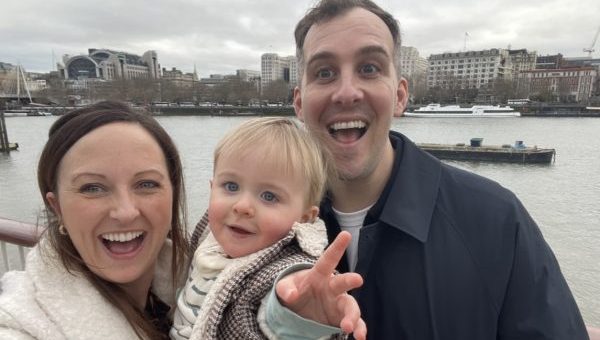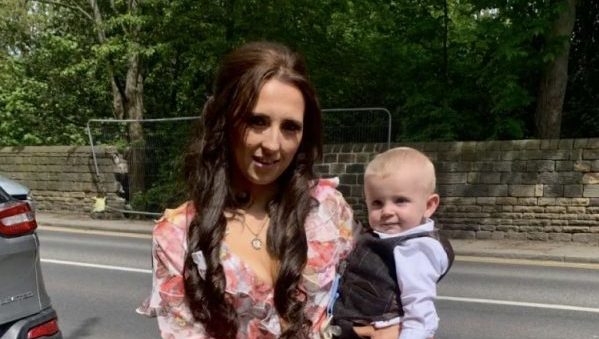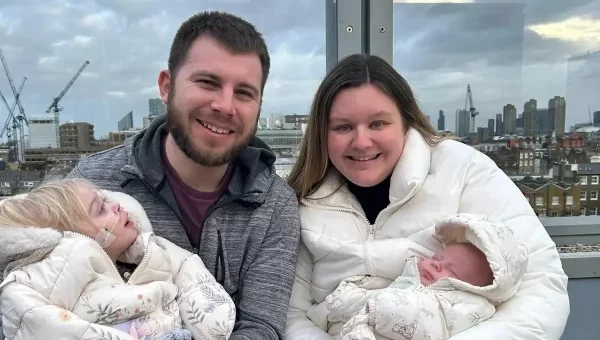Harry is our second child, and during Hayley’s pregnancy there was no indication that something might be wrong. We even had him home for four weeks before we realised he was unwell. Over a year later, however, he is still in hospital and our lives are split between Great Ormond Street Hospital (GOSH), Birmingham Children’s Hospital and Warwickshire, where we live. Harry’s had to undergo major operations because of a rare congenital heart disease called Shone’s Complex. We’ve been told several times that he may not live to see another day. But when Harry’s been treated at GOSH, a relief is that one of us can always be right by Harry’s side because of Guilford Street House, free ‘Home from Home’ accommodation run by The Sick Children’s Trust.

Two days after Christmas 2017, Harry suddenly turned blue and was rushed to hospital. We didn’t know what was happening. One moment we were all together relaxing and the next minute everything had changed. Harry had been home for four weeks and nothing seemed wrong – what could have happened?
We were devastated when tests showed that our tiny Harry had a whole host of heart problems. It was a huge shock and so hard not to blame ourselves for not knowing something was wrong. But there’d been no symptoms or signs.
We were transferred from Hayley’s parents’ local hospital to the Heart Centre at Glenfield Hospital, in Leicester, for more specialist treatment. Harry underwent two heart surgeries in quick succession, but neither were a success and we prepared for the worst. We’d ended 2017 enjoying our very first Christmas as a family but we were starting 2018 knowing that we could be torn apart within days. But Harry’s a fighter, and made it through that weekend.
He was transferred to Birmingham Children’s Hospital and for the first time we were offered accommodation. It was a huge relief as up to this point we’d been driving for hours each day to be with our son. They wanted to do the Ross procedure, another major heart surgery, but it’s not something that’s normally done on children until they’re around ten years old – and Harry had been born just a few months earlier. We knew that if he didn’t have the surgery, he might not make it. But if he did go into theatre, there was a chance he’d never come out. We had to take the risk. Time passed so slowly while Harry was in theatre. But he defied the odds again.
Despite Harry surviving the operation and thinking that the procedure would make things much better, it was discovered that he had an enlarged heart. It was squashing the bronchus joined to his left lung, making it really hard for him to breathe. We needed more specialist treatment, so Harry was transferred to GOSH in London. By this time, it was August and we’d been in and out of three, now four, hospitals since January. Our whole lives had changed. I’d had to give up work as a freelance builder because I had to be there for Harry and try to provide some stability and normality for his brother Riley. Hayley and I had planned to get married over the summer, but we had to put that on hold. We barely saw each other as we were splitting our time between home and the various hospitals. While one of us stayed at home with Riley, the other would travel for hours each day to see Harry wherever he was.
“I found that having a room in Guilford Street allowed me to take a step back from the ward to recover from the physical and mental exhaustion that comes hand in hand with having your child in hospital.”
We didn’t think it would be any different at GOSH – the endless travel and the stress that surrounded it. However, when we arrived at the hospital we were approached by Tina, who works for The Sick Children’s Trust at Guilford Street House. She said that she had a room for me to stay in at the ‘Home from Home’, just a few minutes from GOSH, while Hayley looked after Riley at home. It was amazing, such a sense of relief. It was one less place to be and one less thing to worry about. I found that having a room in Guilford Street allowed me to take a step back from the ward to recover from the physical and mental exhaustion that comes hand in hand with having your child in hospital. I got to know another family staying there, whose little boy also had heart and tracheal problems. We sat together most nights, asking after each other’s sons and also having normal, adult conversations. It helped so much just having someone there who understood, especially as Hayley was miles away.
After several more operations, Harry was finally discharged home in late August. We were so happy. This was the first time our family had been together in nine months, and Riley could finally get to know his little brother. However, our joy was short-lived. Just 40 hours after returning home, Harry stopped breathing and was once again rushed to A&E at Birmingham Children’s Hospital, where they found that a biodegradable stent that had been recently fitted wasn’t working. Harry was taken back to GOSH to have a metal stent fitted instead, and I returned to Guilford Street House. Though I was so sad that Harry was back in hospital, it was reassuring to be back at the house and see the team again.
There was a 99% chance of the new metal stent working. Sadly, Harry is the 1% and his body has rejected it. The next step is establishing him on a home ventilation machine, which will probably take quite a few months. Harry’s condition has raised our awareness of heart problems, so we also had Riley checked out. Sadly it’s been discovered that he has heart problems too, although we don’t know if he’ll need an operation yet.
I am so grateful to The Sick Children’s Trust for keeping me near my son and I want to share our story to raise awareness of its vital work as well as raising the profile of Shone’s Complex.
Shane Lee, Harry’s dad


